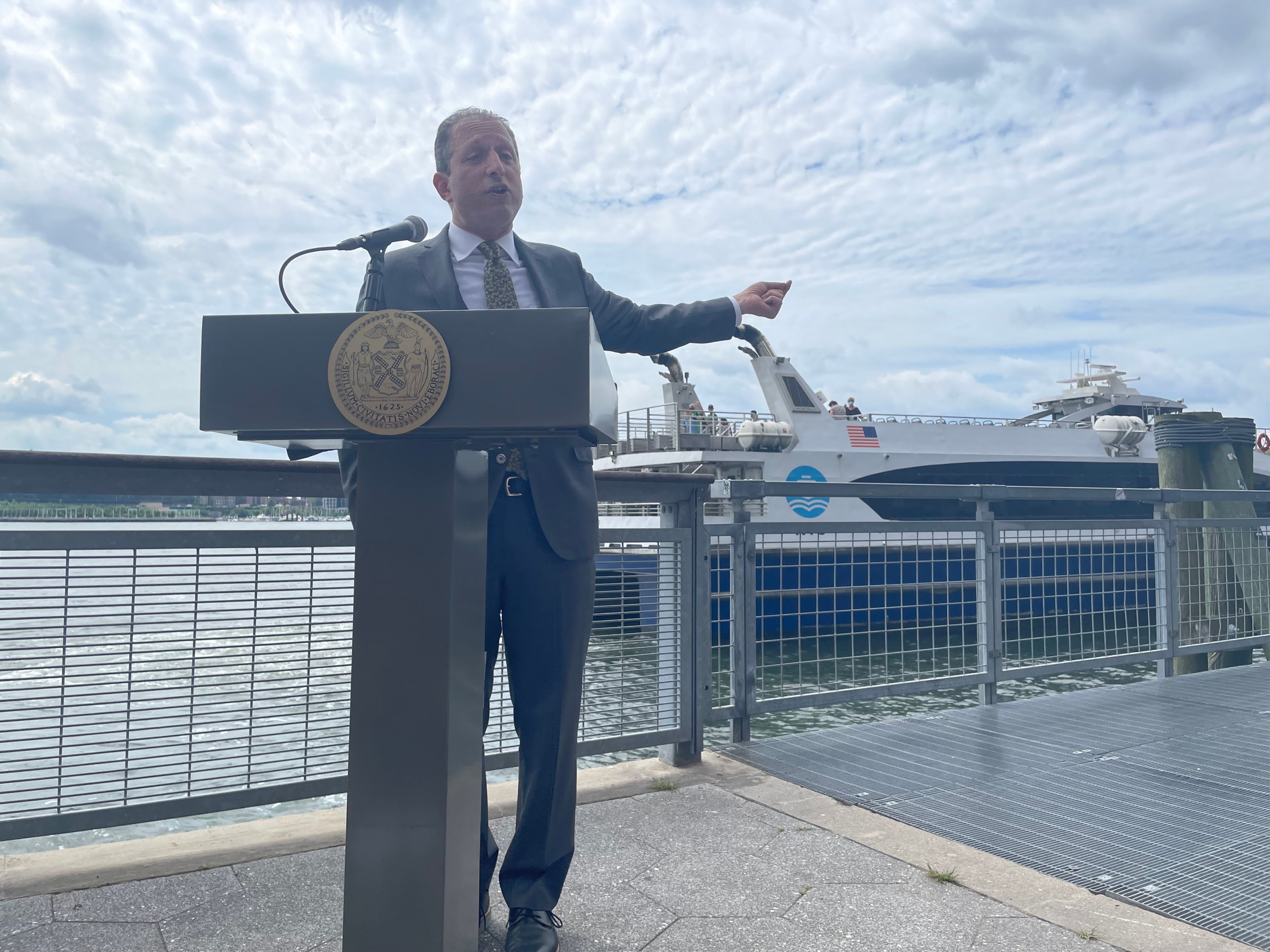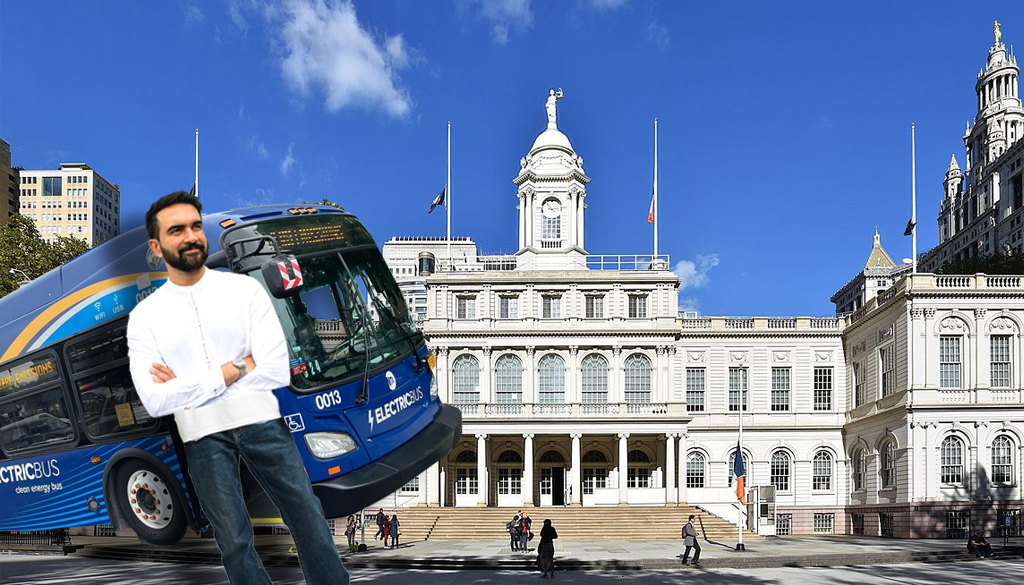NYC Ferry needs a new contract that that institutes a dynamic pricing system that differentiates between regular waterborne commuters and landlubbers who only take to the sea once in a while, according to Comptroller Brad Lander.
The city's bean counter made his case for variable prices on Wednesday as he unveiled an audit of the ferry system that revealed a level of high seas piracy reminiscent of the days of Sir Francis Drake. The Economic Development Corporation, which funds the ferry system that's operated by Hornblower Cruises, didn't disclose $224 million in operating expenses between July 1, 2015 and Dec. 31, 2021, which, according to Lander's office, meant that the city spent $758.5 million on the ferry system over those six-and-a-half years instead of the $534 million that the EDC reported spending on it.
Among many recommendations made in the audit, Lander said that the city, which owns the ferry boats, should seek a new operator for the system itself. The audit did not include a recommendation on what kind of fare system would be best, but Lander told reporters at a balmy waterfront presser that it should be dynamic.
"A dynamic pricing model probably makes sense to look at," Lander said. "[It] will both help operate the system more effectively and then reduce the pressure to understate the expenses and falsely report on what the system actually costs to operate."
Under dynamic pricing, regular ferry commuters could get fares as low as $2.75 or possibly even discounts along the lines of the city's Fair Fares program for lower-income riders, but irregular ferry riders — like those once-a-month Rockaway line users — should pay something closer to the true cost of providing a water-based lift to where they're going.
Also unearthed in the audit was a revelation that the EDC paid $34 million more for ferry boats than they should have, shelling out almost $24 million to end a contract with a previous contract holder in charge of East River ferry routes and playing shell games that Lander's office said showed that taxpayers are paying $12.88 to subsidize each $2.75 ride, up from the previously reported $8.59 per ride.
The EDC and Lander's office traded cannonballs on the question of whether the per-ride subsidy was properly reported by the comptroller's office.
In the audit, the comptroller's office said that the EDC suppressed the true cost per ride by refusing to include in the ferry system costs the depreciation of the city's 38 ferry boats, even though the city shelled out plenty of doubloons for the vessels. Crucially, the audit notes that up until 2018, the Mayor's Management Report defined operating expenses as including "labor, material, capital and overhead." The audit specifically suggests this changed because of the ferry system.
"This original definition was used as far back as 2002," the auditors wrote. "Capital was eliminated from the definition by the former mayor shortly after he announced a $300-million capital investment in the ferry system."
In its own return volley, EDC said that Lander's office was overreaching because neither the Federal Transit Administration nor other ferry systems in the country count depreciation as an operating cost. The EDC further said that the Department of Transportation doesn't include depreciation when calculating the operating cost of the Staten Island Ferry.
Outside observers said that each side in this naval battle has a point.
"Including depreciation, from a strict accounting sense, makes logical sense," said Citizens Budget Commission Executive Director Andrew Rein. "When you have an asset, you use up some of it every year. And there's a cost to that. On the flip side, when you are doing comparative analysis, and we did our ferry analysis a few years ago, we used these national standards so we could compare systems and know how expensive our system is, and the comparative data didn't include that. So that's a totally reasonable position for EDC to have."
But Rein added that if the EDC is going to be transparent about the operating costs and per-rider subsidies, it will have to include the debt service on the capital expenditures it has made to keep the system running.
"If you want to understand how much the system really costs New Yorkers every year, as well as think about what the opportunity costs, if you were to spend that money on something else, you should be using the debt service costs as part of as part of your cost structure," Rein said. "The simple version is, they're both reasonable. But if you're really trying to understand how much New York taxpayers are paying on an annual basis every year, you should be including the debt service cost."
The $2.75 ticket for the ferry, and the subsequent huge subsidy for the system, has been a point of contention since ferry service began in 2017 under then-Mayor de Blasio, who pegged the tickets at the cost of a MetroCard swipe out of hope on that the MTA would eventually agree to free transfers from the boats. That hasn't happened.
Ferry subsidies came in as high as $10.73 per ride in 2019, and were criticized for going to riders who were on average making over $100,000 per year. The ferries have expanded to provide more service since then, which has helped to lower the per-rider subsidy per ride, according to how the EDC calculates it, but the latest rider survey the EDC conducted still found that the average ferry rider makes between $100,000 and $149,000 per year. By comparison, the average bus commuter makes $28,455 and the average subway commuter makes $40,000, according to a 2018 report from ex-Comptroller Scott Stringer.
Critics of the system have pointed out that the hundreds of millions of capital and operating expenses for the boats could have been spent to subsidize Fair Fares for low-income bus and subway riders or to rescue the city's flagging bus service, which before the pandemic moved more people around in a day than the ferry moved in a year. The latest ridership report from the EDC says that there were 22 million total trips on the ferry between May 1, 2017 and March 31, 2022 — meaning that almost five years of ferry ridership still doesn't add up to a month of pandemic-era bus trips.
The EDC did agree with Lander's recommendation that it seek new ferry management, and promised that the process for it would start this summer. Mayor Adams, who offered his own ideas for the ferry service in 2015, keelhauled his predecessor once again for "rushing" the system online and promised a future plan to improve it.
"NYC Ferry offers a critical transportation option that thousands of people use every day," said a City Hall spokesperson. "Concerns around the system’s finances are well known — the prior administration rushed EDC to establish a large and complex ferry system, and we are keenly aware there is room for improvement. We are working actively on an innovative plan to write a new chapter for the ferry system centered on true financial sustainability and access for communities that need it."






